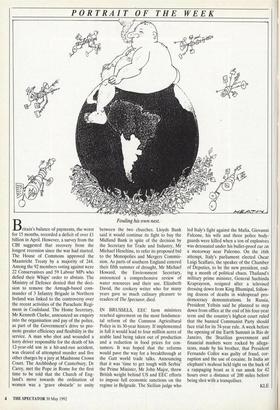PORTRAIT OF THE WEEK
Britain's balance of payments, the worst for 15 months, recorded a deficit of over £1 billion in April. However, a survey from the CBI suggested that recovery from the longest recession since the war had started. The House of Commons approved the Maastricht Treaty by a majority of 244. Among the 92 members voting against were 22 Conservatives and 59 Labour MPs who defied their Whips' order to abstain. The Ministry of Defence denied that the deci- sion to remove the Armagh-based com- mander of 3 Infantry Brigade in Northern Ireland was linked to the controversy over the recent activities of the Parachute Regi- ment in Coalisland. The Home Secretary, Mr Kenneth Clarke, announced an enquiry into the organisation and pay of the police, as part of the Government's drive to pro- mote greater efficiency and flexibility in the service. A man who shot and wounded a lorry driver responsible for the death of his 12-year-old son in a hit-and-run accident, was cleared of attempted murder and five other charges by a jury at Maidstone Crown Court. The Archbishop of Canterbury, Dr Carey, met the Pope in Rome for the first time to be told that the Church of Eng- land's move towards the ordination of women was a 'grave obstacle' to unity Fouling his own nest.
between the two churches. Lloyds Bank said it would continue its fight to buy the Midland Bank in spite of the decision by the Secretary for Trade and Industry, Mr Michael Heseltine, to refer its proposed bid to the Monopolies and Mergers Commis- sion. As parts of southern England entered their fifth summer of drought, Mr Michael Howard, the Environment Secretary, announced a comprehensive review of water resources and their use. Elizabeth David, the cookery writer who for many years gave so much culinary pleasure to readers of The Spectator, died.
IN BRUSSELS, EEC farm ministers reached agreement on the most fundamen- tal reform of the Common Agricultural Policy in its 30-year history. If implemented in full it would lead to four million acres of arable land being taken out of production and a reduction in food prices for con- sumers. It was hoped that the reforms would pave the way for a breakthrough at the Gatt world trade talks. Announcing that it was 'time to get tough with Serbia' the Prime Minister, Mr John Major, threw British weight behind US and EEC efforts to impose full economic sanctions on the regime in Belgrade. The Sicilian judge who
led Italy's fight against the Mafia, Giovanni Falcone, his wife and three police body- guards were killed when a ton of explosives was detonated under his bullet-proof car on a motorway near Palermo. On the 16th attempt, Italy's parliament elected Oscar Luigi Scalfaro, the speaker of the Chamber of Deputies, to be the new president, end- ing a month of political chaos. Thailand's military prime minister, General Suchinda Kraprayoon, resigned after a televised dressing down from King Bhumipal, follow- ing dozens of deaths in widespread pro- democracy demonstrations. In Russia, President Yeltsin said he planned to step down from office at the end of his four-year term and the country's highest court ruled that the banned Communist Party should face trial for its 74-year rule. A week before the opening of the Earth Summit in Rio de Janeiro, the Brazilian government and financial markets were rocked by allega- tions, made by his brother, that President Fernando Collor was guilty of fraud, cor- ruption and the use of cocaine. In India an elephant's mahout held tight on the back of a rampaging beast as it ran amok for 42 hours over a distance of 200 miles before being shot with a tranquiliser.
KLE
















































 Previous page
Previous page